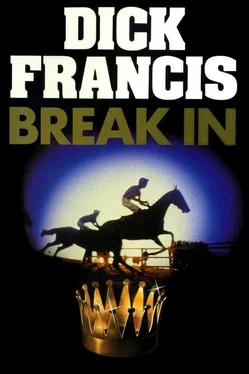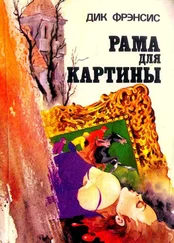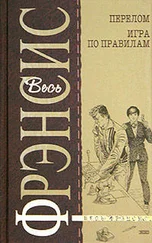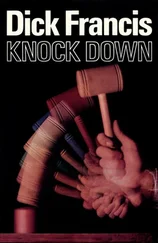We walked Graves’s horses round to Bobby’s second yard behind the main quadrangle and installed them there in two empty boxes, which happened (all to the good, I thought) not to be side by side.
‘Does Graves know his horses by sight?’ I asked Bobby; which was not by any means a stupid question, as many owners didn’t.
‘I don’t know,’ he said dubiously. ‘It’s never come up.’
‘In other words,’ I said, ‘he always knows them because they’re where he expects to see them?’
‘Yes. I should think so. But it’s not certain. He might know them better than I think.’
‘Well... in that case, how about rigging some sort of alarm?’
Bobby didn’t say certainly not, it wasn’t necessary, he said, ‘Where?’
Incredible.
‘On one of the boxes they are normally in,’ I said.
‘Yes. I see. Yes.’ He paused. ‘What sort of alarm? I haven’t any electric gadgets here. If I need any special tight security before a big race I hire a man with a dog.’
I did a quick mental review of his house and its contents. Saucepan lids? Metal trays? Something to make a noise.
‘The bell,’ I said. ‘Your old school bell.’
‘In the study.’ He nodded. ‘I’ll fetch it.’
Bobby’s study contained shelves of tidily arranged mementoes of his blameless early life: cricket caps, silver cups won at school sports, team photographs, a rugger ball... and the hand bell which as a prefect he had rung noisily through his House to send the younger boys to bed. Bobby had been the sort of steadfast team-spirited boy that made the British public school system work: that he had emerged complacent and slightly pompous was probably owing to his many good qualities being manifest to all, including himself.
‘Bring a hammer,’ I said. ‘And some staples if you have any. Nails, if not. And some heavy-duty string.’
‘Right.’
He went away and in due course returned carrying the bell quietly by its clapper in one hand and a tool-box in the other. Between us we installed the bell as near to Bobby’s house as possible and rigged it in such a way that a good tug to the string tied to its handle would send it toppling and jangling. Then we led the string through a long line of staples to the usual home of one of Graves’s horses, and fastened the end of it out of sight to the top of the closed door.
‘OK,’ I said. ‘Go into the house. I’ll open this door and you see if you can hear the bell.’
He nodded and went away, and after a fair interval I opened the stable door. The bell fell with a satisfying clamour and Bobby came back saying it would wake the dead. We returned it to its precarious pre-toppling position and with rare accord walked together into the house.
There had been Fieldings and there had been Allardecks in racing further back than anyone could remember: two families with some land and some money and a bitter mutual persisting hatred.
There had been a Fielding and an Allardeck knifing each other for favour with King Charles II when he held court not in London but in Newmarket, thereby making foreign ambassadors travel wearily north-east by coach to present their credentials.
There had been an Allardeck who had wagered three hundred sovereigns on a two-horse race on Queen Anne’s own racecourse on Ascot Heath and lost his money to a Fielding, who had been killed and robbed before he reached home.
There had been a Mr Allardeck in the Regency years who had challenged a Mr Fielding to a cross-country contest over fearsome jumps, the winner to take the other’s horse. Mr Allardeck (who lost) accused Mr Fielding (an easy victor) of taking a cheating short cut, and the dispute went to pistols at dawn, when they each shot carefully at the other and died of their wounds.
There had been a Victorian gentleman rider named Fielding with a wild moustache and a wilder reputation, and an Allardeck who had fallen off, drunk, at the start of the Grand National. Fielding accused Allardeck of being a coward, Allardeck accused Fielding of seducing his (Allardeck’s) sister. Both charges were true: and those two settled their differences by fisticuffs on Newmarket Heath, Fielding half killing the (again) drunk and frightened Allardeck.
By Edwardian times the two families were inextricably locked into inherited hostility and would accuse each other of anything handy. A particularly aggressive Fielding had bought an estate next door to the Allardecks on purpose to irritate, and bitter boundary disputes led to confrontations with shotguns and (more tamely) writs.
Bobby’s great-grandfather burned down Great-grandfather Fielding’s hay-barn (Great-grandfather Fielding having built it where it most spoiled the Allardecks’ view) only to find his favourite hunter shot dead in its field a week later.
Bobby’s grandfather and Grandfather Fielding had naturally been brought up to hate each other, the feud in their case extending later to bitter professional rivalry, as each (being a second son and not likely to inherit the family estate) had decided to set up as a licensed racehorse trainer. They each bought training stables in Newmarket and paid their lads to spy and report on the other. They cockily crowed when their horses won and seethed when the other’s did, and, if coming first and second in the same race, lodged objections against each other almost as a matter of course.
Holly and I, being brought up in Grandfather Fielding’s tempestuous household, were duly indoctrinated with the premise that all Allardecks were villainous madmen (or worse) who were to be cut dead at all times in Newmarket High Street.
Bobby and I, I dare say, each having been taught from birth to detest the other, might in our turn have come to fists or fire, were it not for my father dying, and Bobby’s father leaving Newmarket with his family and going off into property and commodities. Not that Bobby’s father, Maynard, could bear even the mention of the word Fielding: and the reason he was not speaking to Bobby (as truthfully noted in Intimate Details) was because Bobby Allardeck had dared, despite a promise of disinheritance, to defy his father’s fury and walk up the aisle with Holly Fielding.
When Holly was thirteen her one absolute heroine had been Juliet in Romeo and Juliet. She learned almost the whole play by heart, but Juliet’s part particularly, and became hopelessly romantic about the dead young lovers uniting the warring families of Montague and Capulet. Bobby Allardeck, I reckoned, was her Romeo, and she had been powerfully predisposed to fall in love with him, even if he hadn’t been, as he was, tall, fair-haired and good-looking.
They had met by chance (or did she seek him out?) in London after several years of not seeing each other, and within a month were inseparable. The marriage had succeeded in its secret purpose to the extent that Bobby and I were now almost always polite to each other and that our children, if we had any, could, if they would, be friends.
Bobby and Holly had returned to Newmarket, Bobby hoping to take over as trainer in his by then ailing grandfather’s yard, but the quarrelsome old man, calling his grandson a traitor to the family, had made him pay full market price for the property, and had then died, not leaving him a penny.
Bobby’s current financial troubles were not simple. His house and yard (such small part of it as was free from mortgage) would as a matter of course be held by the bank as security for the extra loans they’d made him for the buying of yearlings. If the bank called in the loans, he and Holly would be left with no home, no livelihood, and an extremely bleak future.
As in many racing houses, a great deal of life went on in the kitchen, which in Holly and Bobby’s case was typically furnished with a long dining table and a good number of comfortable chairs. A friendly room, with a lot of light pine, warmly lit and welcoming. When Bobby and I went in from the yard Holly was whisking eggs in a bowl and frying chopped onions and green peppers in a large pan.
Читать дальше




